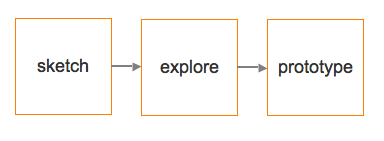At Ubicomp this fall, Scott Davidoff—a doctoral student at CMU—presented a design method for rapid exploration of design concepts based on speed dating. Rachel Hinman of Adaptive Path wrote a nice summary of that September presentation.

Scott Davidoff believes designers need to invest in early exploration of user experience
The big idea behind user-centered design is to investigate the needs of the user and attempt to address them before building costly systems doomed to be a mismatch. Even within design, mismatch and expense are issues. Design practice usually involves sketching and prototyping, but Davidoff notes that the former is merely generative and the latter iterative. He argues that it is vital to give time in between to exploring user experience.
Enter speed dating.
With origins in the late 1990s, speed dating is a concept first used by Jewish matchmakers to get young singles to mingle and find spouses. Random pairings last for a few minutes at a time, just long enough for the couples to have short conversations and make quick judgments before moving on to the next match. The dating technique has been studied in academic circles to support notions that most decisions about people are made quickly, and that the criteria for a successful match tends away from traditional factors, such as health, prior marital status, and religion.
To fill the gap between generation and iteration, Davidoff applies this model to design by suggesting a method that provides a structured way to “flirt with design alternatives.” Speed dating between design concepts and users attempts to provide validation and investigate user enactment.
In Davidoff’s research, a family is shown several storyboards of different concepts, ranging in scope, issue and participants. Aggregated, the best concepts will surface as the most popular, giving the designer a mechanism for pruning ideas. The technique also will identify major areas of concern in a way that simple surveys or interviews may not.
These observations and resulting insights are augmented by a second design speed dating exercise. This time, the family is asked to act out situations using simple sets and paper prototypes of the storyboarded environments. The role play spotlights boundaries of user behavior by moving the exploration away from paper and into the real world. This information is charted in a two-dimensional matrix that pits (in Davidoff’s example) the life cycle of an activity with the proactivity of a user.
Speed dating does add another step in the design process and about two months to the development cycle, but it is an inquiry that focuses on user experience rather than opinion or system evaluation. Because it would happen shortly after the sketching phase of the design process, the method uncovers issues that may not otherwise surface until prototypes are put in front of users. Even then, the focus of prototype evaluation is typically more on functional effectiveness and not experiential impact. With speed dating, larger themes may be revealed that radically revise the core strategy and lead the team to better designs.
This research is a byproduct of work on smart home design being conducted by John Zimmerman, who gave a talk at the IU School of Informatics last February () that included insights learned through this process. Scott’s slideset (ppt) and paper (pdf) are available on his CMU web page.